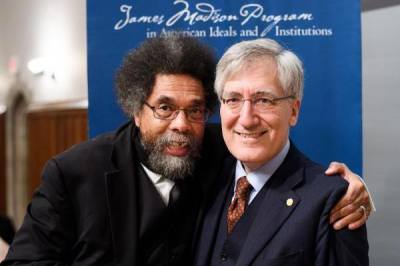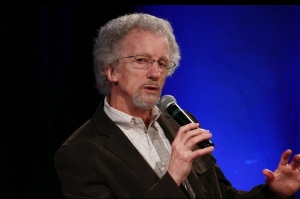A reflection on humility in the pursuit of truth

If asked, most of us would admit that we’re fallible. But all of us are sometimes tempted to act, or think, that we’re not. We wrap our emotions so tightly around our convictions that we become dogmatists — unwilling to be challenged, to genuinely consider that we might be wrong about things that are important to us.
But if we are going to get anywhere in life, then we have to be humble enough to be open to the possibility that we could be wrong about any number of things. This is especially important for those of us who seek to be followers of Christ: our ultimate allegiance is to God and, thus, to the truth.
I recently participated in Pepperdine University’s President's Speaker Series with my good friend and fellow truth-seeker, Cornel West, professor of the practice of public philosophy at Harvard University and professor emeritus at Princeton University. In our dialogue “Honesty and Courage, Humility and Hope,” we discussed the habits of heart and mind — the virtues — that are required to engage in thoughtful and respectful conversation that explores diverse viewpoints.
What I love about Pepperdine is that it is not only an intellectually serious, morally committed Christian university dedicated to following the teachings of Jesus Christ, but one that is open to exploration and dialogue with those of differing perspectives within the Christian community and outside of it. As an academic institution, Pepperdine has set an example for other institutions, be they religiously affiliated or non-sectarian, to follow.
If we truly desire to pursue truth, then we must honestly recognize our own fallibility. We must be willing to be made uncomfortable because truth-seeking is never a comfortable venture.
Something we all know about ourselves is that we are wrong about some things. We all hold some beliefs that are not true. And if we are honest with ourselves, we will recognize that among the things we may be wrong about are some important, morally significant things.
It’s natural to wrap our emotions more or less tightly around our convictions. And it’s not a bad thing, in and of itself. After all, we need some emotional investment in order to make things happen, to get things done.
Yet, if we allow our emotions to get wrapped too tightly around our convictions, then we do become dogmatists. We lose the intellectual humility that is an indispensable precondition of the truth-seeking enterprise. And in a healthy culture, people should be able to muster the honesty and courage to speak truth to cultural, economic, and political power — and to face truth, and the need to embrace it ourselves, no matter how uncomfortable it makes us.
We need to have conversations with people of other faiths and of no faith because we have much to learn from them. The only way we are going to move in the direction of truth is by opening ourselves up to being challenged. We need the honesty and courage, humility and hope required to speak the truth and seek the truth, including painful truths that unsettle not only those with whom we disagree, but also our friends and ourselves.
Robert George is the McCormick Professor of Jurisprudence and director of the James Madison Program in American Ideals and Institutions at Princeton University. He has served as chairman of the U.S. Commission on International Religious Freedom and as a presidential appointee to the U.S. Commission on Civil Rights. George has also served on the President’s Council on Bioethics and as the American member of UNESCO’s World Commission on the Ethics of Science and Technology. He was a judicial fellow at the Supreme Court of the United States, where he received the Justice Tom C. Clark Award.
A Phi Beta Kappa graduate of Swarthmore College, George holds degrees from Harvard University and Oxford University, in addition to 22 honorary doctorates. He is a recipient of the U.S. Presidential Citizens Medal, the Honorific Medal for the Defense of Human Rights of the Republic of Poland and is a member of the Council on Foreign Relations. His most recent book is “Conscience and Its Enemies: Confronting the Dogmas of Liberal Secularism."



























